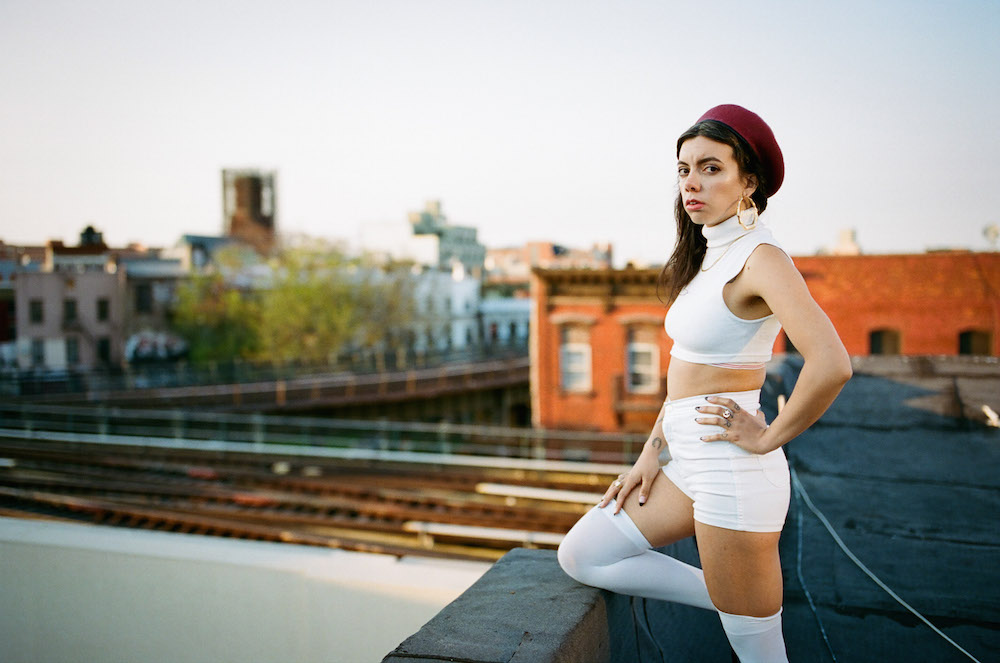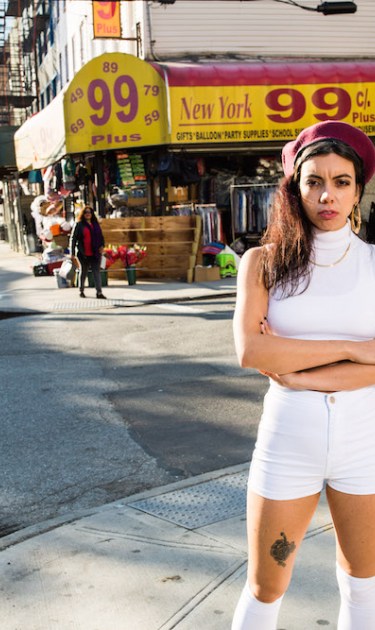Alynda Segarra has gone from teenage runaway to acclaimed recording artist, from young radical to one of the most promising Latinx voices in U.S. folk music. Her latest album The Navigator is a largely autobiographical concept album about a young Puerto Rican girl’s journey to reconcile her identity with her place in the world, while today, Segarra’s own path has led her to the activist frontline. Her uncompromising view of intersectional identity has molded her career, putting her advocacy of domestic abuse survivors, Puerto Rican liberation, and government criticism at the center of her discourse, tying her own liberation to that of other people.
On July 27 at New York’s Lincoln Center, Hurray For The Riff Raff will headline the second edition of Nosotros Festival, a free and politically minded event of Segarra’s own conception. The festival will feature many performers and speakers, among them community leader and Young Lords icon Felipe Luciano, a driving inspiration behind Segarra’s own activism. Ahead of Nosotros Fest, we spoke to Alynda Segarra about the influence of the Young Lords on her work, and the lessons she has learned and hopes to share with the community.
Nosotros Fest takes place at Damrosch Park at Lincoln Center on Thursday, July 27. For more info, click here.
This week is Nosotros Fest and activist-poet Felipe Luciano will be speaking at the event. He is of course a crucial part of the Young Lords’ legacy in New York City, and we know you follow the organization’s work on a national level. Are there any particular instances of the Young Lords’ history that have resonated and put you on the path you’re on today?
When I was putting together this last album [The Navigator], writing these songs was a really big journey, with me going to Puerto Rico and also feeling like I needed to learn my history beyond being part of a proud Boricua family and eating their food. That’s kind of where it ended for me. So a big part was watching documentaries and trying to learn about the music of Puerto Rico. Then, when I went to The Bronx Museum and saw an exhibition about the Young Lords a couple of summers ago – that’s when it all clicked. I thought, “This is where my radicalism comes from; this is where my feminism comes from.” It just became a lot more real for me. I’d always heard of the Young Lords but I didn’t really feel that connection of where it fit in with me being a radical person or a feminist.

I first went to that exhibition and started watching documentaries like Palante, Siempre Palante! and El Pueblo Se Levanta. I also started watching some of their online panels and Felipe Luciano specifically was creating bridges by talking about Afro-Latino-ism and how Puerto Rican people are multiracial, highlighting that intersectionality. All of our struggles are one struggle, which is the beauty of the Puerto Rican people.
“All of our struggles are one struggle, which is the beauty of the Puerto Rican people.”
There is also a part in one of these documentaries where he’s talking about going to schools, doing breakfast programs, getting all these really great ideas from the Black Panthers. Really, working with Puerto Rican kids and feeling so sorrowful because of how not proud they were – because they couldn’t see themselves. He still talks about that today in that we travel all over the world and people go, “Oh my God, you’re Puerto Rican,” and we can’t see that wonder within ourselves. And that speaks a lot to Latino people, and people of color in general, that we can’t see the beauty and the strength and the brilliance of where we come from. Just hearing him say it really woke me up.
Hearing him do this talk at The Bronx Museum, he was talking about how complicated the rhythms of our folk music are. Putting Puerto Ricans and Latinos in this context of brilliance really blew my mind, and it made me so sad that I was surprised. And it’s because nobody ever said that to me. He really speaks to that and knows how to put it in the language that wakes you up, so I’m so honored that he is speaking [at Nosotros Fest] because there are so many who still need that wake up call, especially with everything that is going on right now.
So Nosotros Fest is a direct response to the times?
I just had enough with the dehumanization of immigrant people. I felt like, “I can’t do this; I can’t hear this anymore.” I’m so privileged to have been born here. Puerto Ricans are citizens, but obviously that comes with a lot of colonialism and baggage. Nosotros [Fest] really came to me as this idea that yes, I have this privilege and I gotta make a space that is intentionally saying, “There are no borders here and everybody here is a fucking human being. The word alien does not exist in this fucking space.”
I spent so much of my life running from my Latinx identity and so much of that came from [light] skin privilege. I convinced myself that one day I’d wake up looking like Gwen Stefani. I spent all this time as a kid wishing that if I tried hard enough, one day I could be white enough.

“I spent so much of my life running from my Latinx identity.”
With the Young Lords you see people of all colors coming together in this militant stance. As Felipe said in one of his speeches, “We were looking at the authorities in the city and saying ‘If you do something to our people, we are watching you and we will have a response.’” And I started to wonder how I could put this in my music and in my work. I am watching how Latino people and immigrants in general are being treated and I don’t want this to happen on my watch. It was about putting this intention into the work. But there are so many artists who are doing such amazing work right now. Obviously Helado Negro, Xenia Rubinos and Las Cafeteras. Once I started thinking about these things, I realized we’re all thinking about it at the same time. It’s a really amazing time for Latinx culture, music, and performance.
I think our work is to learn from [the Young Lords]. They were so feminist and the women came together and said, “We’re not dealing with this machismo anymore, or your homophobia.” Their way of thinking really spoke to me about this idea. Those are my people being ahead of the curve, rejecting these boundaries that pull us apart, understanding that when we’re divided, we’re conquered. And that’s what I’m hoping to bring to the festival.




